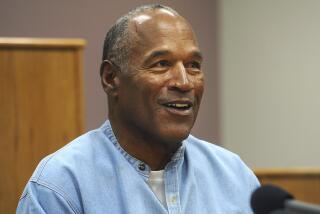Judge Denies New Trial for Simpson
- Share via
Superior Court Judge Hiroshi Fujisaki on Monday refused to grant O.J. Simpson a new civil trial or lower the $33.5-million award a jury ordered him to pay the survivors of murder victims Ronald Lyle Goldman and Nicole Brown Simpson, saying that amount “may be considered insufficient, rather than excessive.”
Simpson’s lawyers had argued for a new trial on the grounds that Fujisaki made a series of mistakes that biased the jury against Simpson, that jurors acted improperly during the deliberations, and that one juror failed to disclose ties to the district attorney’s office.
The resulting financial award, Simpson attorney Daniel P. Leonard said Monday, was the result of “passion and prejudice” rather than a fair application of law.
But in a series of rulings in favor of the plaintiffs, Fujisaki told the defense repeatedly that he ruled against their objections during the trial and was not going to revisit them Monday.
The civil trial jury found Simpson, who was not in court Monday, liable for the June 12, 1994, deaths of Goldman and Nicole Simpson, his ex-wife. A criminal court jury had acquitted Simpson of murder charges.
Fujisaki’s refusal to grant a new trial was not a surprise to many in the legal community, since the defense was asking the judge to overturn rulings that he made himself--more than once, in some instances.
And the judge’s unwillingness to reduce the monetary award was consistent with earlier rulings, such as one that allowed the jury to consider how much money Simpson might be able to make in the future, said Laurie Levenson, associate dean of Loyola Law School.
“This judge wanted to make sure, the same way the jury wanted to make sure, that O.J. Simpson never makes a dime off these murders,” Levenson said. “This was [Fujisaki’s] swan song and I think there was a message he wanted to send to Mr. Simpson, that no amount of money could be excessive when you talk about taking innocent lives.”
In his request for a new trial, Simpson had argued that Fujisaki should not have allowed the plaintiffs to present some key parts of their case, including testimony about Simpson’s marital problems and evidence of alleged domestic violence against Nicole Simpson.
The defense team also questioned Fujisaki’s decision to allow Simpson to be questioned about a polygraph test he had failed. So-called lie-detector tests are barred from California criminal trials and are usually not allowed in civil cases because the results are not considered reliable.
The defense team argued, though, that Fujisaki should have allowed other evidence, such as testimony about inept work in the Los Angeles Police Department crime lab and taped testimony by former LAPD Det. Mark Fuhrman. Evidence about Fuhrman’s racist comments and the crime lab’s sloppiness were key components of Simpson’s criminal defense, in which attorneys argued that Simpson was framed.
In Monday’s proceedings, however, Fujisaki sustained each of the plaintiffs’ objections to arguments by Simpson attorneys about jury misconduct, ruling that evidence that they presented was either irrelevant or based on hearsay.
The defense had argued that after the removal of one juror during deliberations, the jury failed to begin reviewing the evidence anew. No juror, however, would come forward to substantiate that claim. The judge also denied that the plaintiffs had eliminated potential jurors on the basis of race.
Fujisaki also responded to a defense request for a new trial because of improper evidentiary rulings and jury instructions by telling attorneys on each point that he stood by his trial rulings.
The judge used much of his time to explain why he was upholding the jury’s extraordinary damage award. Contrary to the defense’s claim, the judge ruled, the plaintiffs presented credible evidence about Simpson’s future earnings.
What’s more, Fujisaki said, the Goldman and Brown families presented evidence that Simpson’s marketability might indeed be increased by the notoriety surrounding the case.
“It would be unconscionable to allow the defendant in this case to profit from his wrongdoing, particularly in light of the reprehensibility of his acts,” Fujisaki said.
The defense also argued that Fujisaki should have told the jury that while they could punish Simpson, they could not destroy him financially.
But the judge cited evidence that Simpson has three pension funds, all of which he claims are shielded from creditors, that have a total present value of more than $4.1 million.
Therefore, Fujisaki said, “the punitive damages are just, reasonable and not excessive.”
The civil jury ordered Simpson to pay Goldman’s parents $8.5 million to compensate them for the loss of their son and $12.5 million in punitive damages. They also awarded Simpson’s two young children $12.5 million in punitive damages.
Goldman’s father, Fred Goldman, who attended the proceedings with his wife and daughter, told reporters after the hearing that he felt gratified by Fujisaki’s strong words.
“I think the judge said it all,” Goldman said. “There is no amount of money that is enough to equal [Simpson’s] heinous actions.”
Leonard, who sat by himself on his side of the courtroom, in sharp contrast to the cadre of attorneys and others in court on behalf of the plaintiffs, had a one-word response immediately after the hearing:
“Appeal,” he said.
Simpson has 30 days to file that motion.
More to Read
Sign up for Essential California
The most important California stories and recommendations in your inbox every morning.
You may occasionally receive promotional content from the Los Angeles Times.













